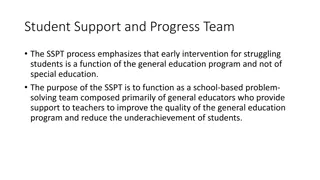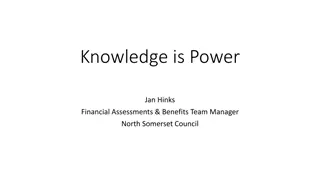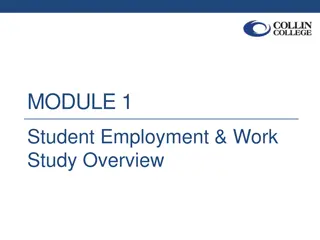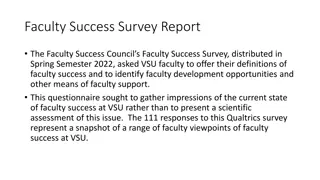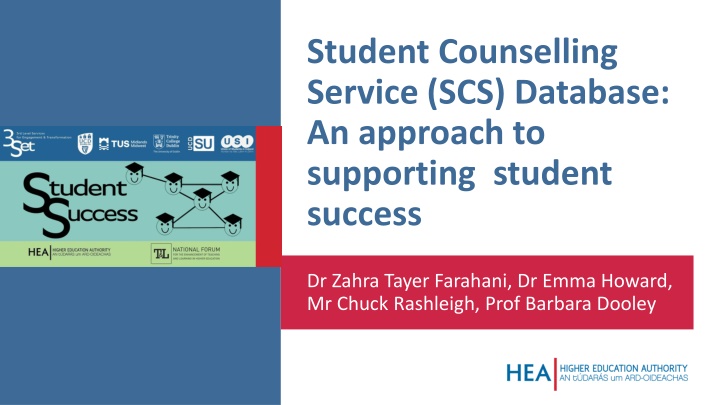
Supporting Student Success Through SCS Database Approach
Explore the Student Counselling Service (SCS) Database and its role in enhancing student success in Higher Education Institutions (HEIs). Discover how data collection, evidence-based practices, and collaboration can significantly impact student outcomes and personal development.
Download Presentation

Please find below an Image/Link to download the presentation.
The content on the website is provided AS IS for your information and personal use only. It may not be sold, licensed, or shared on other websites without obtaining consent from the author. If you encounter any issues during the download, it is possible that the publisher has removed the file from their server.
You are allowed to download the files provided on this website for personal or commercial use, subject to the condition that they are used lawfully. All files are the property of their respective owners.
The content on the website is provided AS IS for your information and personal use only. It may not be sold, licensed, or shared on other websites without obtaining consent from the author.
E N D
Presentation Transcript
Student Counselling Service (SCS) Database: An approach to supporting student success Dr Zahra Tayer Farahani, Dr Emma Howard, Mr Chuck Rashleigh, Prof Barbara Dooley
Introduction The role SCSs in student success SCS Database Applications of SCS data for student success Outcomes of the SCS Database project
SCSs in Higher Education Institutions (HEIs) Embedded mental health services Integral part of the student mental health on the campus Providing psychological support to students Contribution to students personal development Contribution to students academic performance
Data Collection in SCSs As part of their practice Categories of data collection: Student demographic Presenting issues Outcome measures Counselling Impact on Academic Outcomes (CIAO) Student feedback
The Importance of an Evidence-Based Approach Identify different needs in various groups of students Identify those who are more at risk Identify effective interventions Service evaluation Service development based on identified needs
Key elements of an evidence-based approach Robust and systematic data collection Research based practice Practice based research
SCS Database Standardised data collection across SCSs A sectorial approach Support SCSs in their data collection Provide evidence to inform decision making Enhance collaboration between researchers and practitioners Provide further evidence through a practice research network (PRN)
Our Approach Site visits and interviews Webinar Presentation for stakeholders e.g., Psychological Counsellors in Higher Education in Ireland (PCHEI) members, GDPR officers, Registrars and Heads and Representative groups One to one meetings with SCSs Correspondence with DPOs and Research Ethics Committees
Use of the Data Beneficial use of the data Sectorial reports Benchmarking Research Service development Funding applications Showcase SCSs contribution to student mental health Misuse of the data Out of context interpretation Ranking of SCSs by authority and funding bodies
Progress to Date Conducted 28 interviews with staff in 22* HEIs Organised a webinar on data standardisation across HEIs Finalised a standardised dataset Prepared documentations including data protection impact assessment and data sharing agreements Agreed upon a governing structure Built a secure and GDPR compliant database Signed a memorandum of understanding (MoU) with PCHEI as our partner 11 number of HEIs have agreed to participate and 2 number started data collection
Going Forward Data transfer round 1 - proof of concept Data collection round 2 - with more HEIs First annual sectoral report Sustainability plan
Conclusion Evidence-based approach requires robust data collection. There are various benefits and challenges in a national approach to data collection. Funding and resources, knowledge and expertise, communication, collaboration and trust are important elements for success. This can apply to other student services such as maths support centre, academic writing centres, student advisors, career service etc.
Thank You! Zahra.tayerfarahani@ucd.ie Emma.Howard@ucd.ie Chuck.Rashleigh@tcd.ie Barbara.dooley@ucd.ie




